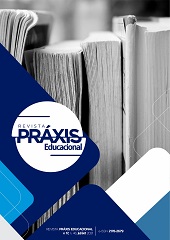The insert of the terminology “right to learning” in the legal framework of teacher training
DOI:
https://doi.org/10.22481/praxisedu.v17i46.8921Keywords:
Teacher Education, National Curriculum Guidelines, Right to LearningAbstract
It is assumed that the National Curriculum Guidelines for Initial Teacher Training for Basic Education and the annex called Common National Base for Initial Basic Education Teacher Training (BNC-Training) support an economicist approach in in line with the current ultraliberal project. It is argued that Opinion CNE/CP No. 22/2019 and respective Resolution CNE/CP No. 02/2019 and CNE/CP Opinion No. 14/2020 and CNE/CP Resolution No. 1/2020 recover a teacher training project anchored in technical rationality, politically and institutionally defeated in the early 2000s. supports and which elements characterize the teacher training project inscribed in the 'new' guidelines. It resorts to documentary research, focusing particularly on the analysis of the insertion of the terminology "right to learning" in the new guidelines with a view to revealing the implications for the initial training of teachers. The aim is, therefore, to trace the path that led to the incorporation of the term “learning right” in the regulations pertaining to teacher education. It adopts the concept of learning and has Biesta (2012, 2013, 2017) as a reference author to analyze the legal discourse. The replacement in the normative text of the language of education by the language of learning is materialized in the BNC-FI and BNC-FC with the listing of skills and abilities, obliterating the place of knowledge in the teacher education project and, therefore, in training of students in basic education, indicating the influence of a matrix based on technical rationality in training processes to the detriment of a foundation based on critical rationality.
Downloads
References
BRASIL. Ministério da Educação. Conselho Nacional de Educação/Conselho Pleno. Parecer CNE/CP no 22/2019.Diretrizes Curriculares Nacionais para a Formação Inicial de Professores para a Educação Básica e Base Nacional Comum para a Formação Inicial de Professores da Educação Básica (BNC-Formação). Aprovado em: 7/11/2019. Parecer Homologado - Portaria n° 2.167, publicada no D.O.U. de 20/12/2019, Seção 1, p. 142.
BRASIL. Ministério da Educação. Conselho Nacional de Educação/Conselho Pleno. Resolução CNE/CP no 2, de 20 de dezembro de 2019. Define as Diretrizes Curriculares Nacionais para a Formação Inicial de Professores para a Educação Básica e institui a Base Nacional Comum para a Formação Inicial de Professores da Educação Básica (BNC- Formação).
BRASIL. Ministério da Educação. Conselho Nacional de Educação/Conselho Pleno. Parecer CNE/CP no 14/2020. Diretrizes Curriculares Nacionais para a Formação Continuada de Professores da Educação Básica e Base Nacional Comum para a Formação Continuada de Professores da Educação Básica (BNC-Formação Continuada). Aprovado em: 10/7/2020. Parecer Homologado - Portaria n° 882, publicada no D.O.U. de 26/10/2020, Seção 1, p. 57.
BRASIL. Ministério da Educação. Conselho Nacional de Educação/Conselho Pleno. Resolução CNE/CP no 1, de 27 de outubro de 2020. Dispõe sobre as Diretrizes Curriculares Nacionais para a Formação Continuada de Professores da Educação Básica e institui a Base Nacional Comum para a Formação Continuada de Professores da Educação Básica (BNC- Formação Continuada).
Downloads
Published
Issue
Section
License

This work is licensed under a Creative Commons Attribution-ShareAlike 4.0 International License.
Você é livre para:
Compartilhar - copia e redistribui o material em qualquer meio ou formato; Adapte - remixe, transforme e construa a partir do material para qualquer propósito, mesmo comercialmente. Esta licença é aceitável para Obras Culturais Livres. O licenciante não pode revogar essas liberdades, desde que você siga os termos da licença.
Sob os seguintes termos:
Atribuição - você deve dar o crédito apropriado, fornecer um link para a licença e indicar se alguma alteração foi feita. Você pode fazer isso de qualquer maneira razoável, mas não de uma forma que sugira que você ou seu uso seja aprovado pelo licenciante.
Não há restrições adicionais - Você não pode aplicar termos legais ou medidas tecnológicas que restrinjam legalmente outros para fazer qualquer uso permitido pela licença.












